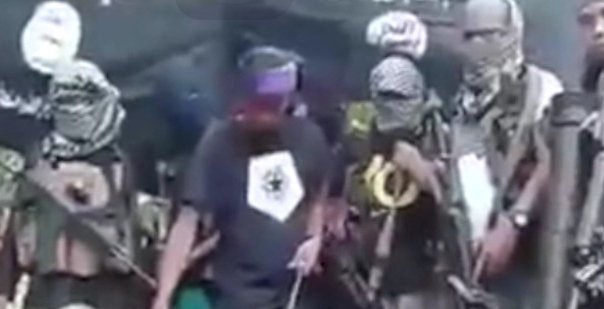
Abu Sayyaf. INQUIRER FILE PHOTO
The murder of Jurgen Kantner was the latest attributed to the Abu Sayyaf, a kidnap-for-ransom gang that is believed to have earned millions of dollars through its grisly business since the 1990s.
Here are five questions and answers about kidnappings in the southern Philippines:
Who is doing it?
The Abu Sayyaf is a radical offshoot of a Muslim separatist insurgency that has claimed more than 120,000 lives in the south of the mainly Catholic Philippines since the 1970s.
The group was established in the 1990s with funds from a relative of former Al-Qaeda leader Osama bin Laden, although its key leaders have since switched allegiance to the rival Islamic State of Iraq and Syria (ISIS) group.
The Abu Sayyaf’s strongholds are the relatively small Muslim-populated islands of Jolo and Basilan in the far south of the Philippines.
It has only about 400 armed followers, according to the latest military estimate, but when members are killed in military battles it can easily restock from the largely supportive local communities.
Who is getting kidnapped?
The Abu Sayyaf has been involved in the kidnapping of hundreds of people since the 1990s, according to security analysts.
Using fast boats, the militants raid resorts, coastal communities and port areas in the southern and western Philippines, sometimes travelling hundreds of kilometers from their strongholds and as far as Malaysia’s Sabah state.
Many of its highest-profile targets have been foreign tourists staying at beach resorts.
In recent years the Abu Sayyaf has heavily expanded operations into the waters around the southern Philippines, abducting Indonesian, Vietnamese, Korean and Malaysian sailors on fishing vessels and cargo barges.
While their biggest paychecks come from kidnapping foreigners, locals such as businesspeople and schoolteachers are also frequently abducted then ransomed for smaller amounts.
Currently the Abu Sayyaf is holding six Vietnamese, five Malaysians, seven Indonesians, a Dutchman and seven locals, according to the military.
How lucrative is the business?
A single kidnapping can literally earn millions.
The Abu Sayyaf claimed it had received all of the more than $5 million ransom it demanded for a German couple abducted off their yacht in 2014 and released after six months. It posted a video on YouTube of the cash.
Defense Secretary Delfin Lorenzana said this month companies that employed two Indonesian sailors paid a ransom of 20 million pesos ($400,000) for their release.
What’s been done to stop them?
From 2002-2014, the US deployed special forces to train and provide intelligence to Filipino troops, which led to the killing or arrest of many Abu Sayyaf leaders.
US assistance was scaled back after the Pentagon concluded the group, originally with about 1,000 fighters, had lost the ability to launch international attacks.
Shortly after taking office last year, President Rodrigo Duterte launched a military offensive to “destroy” the Abu Sayyaf. But, like his predecessors who also waged assaults that claimed dozens of soldiers’ lives, Duterte has so far failed.
Why are they so resilient?
Mastery of the terrain in the mountainous and jungle-clad Jolo and Basilan islands, as well as support from the local communities, enables them to fend off military assaults.
The huge ransoms also allow them to buy more weapons and pay off local communities.
Perhaps most importantly, local authorities and security forces who should be trying to stop them are also involved.
“Rogue elements of the police, military, village officials or higher officials are involved,” Rommel Banlaoi, chair of the Philippine Institute for Peace, Violence and Terrorism Research, told AFP.
“It’s really organized crime.”
http://newsinfo.inquirer.net/876133/answers-on-kidnappings-in-the-philippines

No comments:
Post a Comment
Note: Only a member of this blog may post a comment.